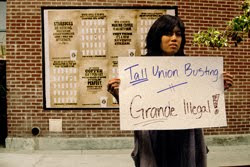The New York Times wrote a story about the Starbucks campaign which caught the attention of filmmaker, Robert Greenwald, who had been shooting an anti-Starbucks film about their labor practices and union busting.

On the website Stop Starbucks, Robert Greenwald put out a call asking people to enter the contest and post pictures on Twitter with messages about Starbucks' labor practices. Faster than you can order a Venti-double long-extra hot-skinny-latte the Starbucks campaign was hijacked by anti-Starbucks tweets like "Wake up and smell the union abuse."
The question is, could Starbucks have done anything to prevent the misuse of their campaign? Or does this mean that large high profile (and often controversial) organisations should shy away from using social media to promote themselves? What do you think?

They cannot control (prevent) subversion. They have to cope with it and court the same publics and opinion leaders.
ReplyDeleteMaybe they should have people within their PR/marketing department anticipating things like these and how they can handle it. It is not the firs time that Starbucks has been in trouble. They should probably sort themselves out with the union thing and put out a stronger campaign indirectly responding to their anti-campaigns
ReplyDeleteUsing social media is like entrusting the public with the success of your campaign - It's a big risk. As another example, check out the Skittles website: www.skittles.com
ReplyDeleteThey have basically handed their entire website over to social media - whenever the word "Skittles" is used in conversation on Twitter or Facebook, it's automatically published on a news feed on the site.
The upside: It encourages people to talk about Skittles. The risk: any negative comments about the product are broadcast by Skittles themselves, in the full view of their stakeholders and consumers.